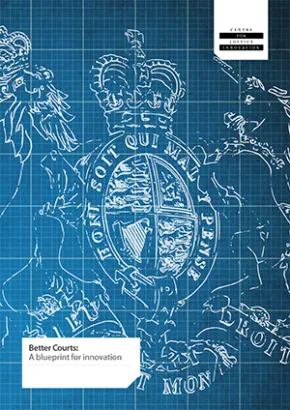Today’s challenges demand that courts innovate. While overall crime rates are falling, we are seeing increasing numbers of complex cases such as sexual assault and domestic abuse. And the difficulty of dealing with these cases is compounded by falling levels of resources. This report offers a vision for how courts can respond to these changing demands.
In order to face these challenges, we must reconsider the role of courts. We should resolve simple cases outside of court and refocus our resources on finding better ways for courts to handle to complex cases and safeguard vulnerable victims.
At the same time, we should create a culture of innovation by modernising the way in which are courts are run, empowering our magistrates to engage with their local communities and dedicating funds to testing new ideas.
Challenging times
Four trends are forcing us to look again at how our criminal courts work.
First, crime is changing. The rates of most crimes are falling. However, those crimes that are on the rise, like domestic and sexual abuse, are often complex and require a more sophisticated approach in order to secure prosecutions, protect victims and ensure that justice is done.
Second, there is less money to spend on justice. This forces us to think differently about the purpose of courts and how they operate.
Third, equal access to and the common experience of justice is currently in sore need of improvement in England and Wales. Successive policy choices have created a system which fails to provide sufficient access to justice for all.
Fourth, the world that criminal courts operate in is changing fast. The greater availability and use of information technology is transforming our lives and our public services, asking questions of how our courts can and ought to work more flexibly.
Building better courts
There are a number of things we can do to create courts that respond to these challenges.
Firstly, we should free up resources by reserving courts for the cases that need to there – either because the facts are in doubt or because the crime is so serious. For other cases, we should make more use of out of new, strengthened versions of court disposals like cautions.
Secondly, we should use the resources saved by diverting cases to develop specialist courts to handle complex cases. In particular, we propose the testing of new integrated domestic abuse courts which bring family, civil and criminal court cases into the same court presided over by the same judge. We should also explore the possibility of piloting specialist problem-solving courts to deal with groups of offenders who have complex and distinctive needs like women and young adults.
Alongside these other changes, we should make our courts feel fairer for those who come into contact with them. By making the better use of technology, improving training for court staff and judges, and more effective case management, we can ensure that our justice system commands the respect of the public.
Unlocking innovation through structural reform
Currently there are many barriers to innovation in the court system. If we are to realise the kind of change we need we must also rethink how our court system is organised in order to need to build a new culture of innovation:
- We should empower magistrates to re-engage with their communities by involving them in activities like overseeing community resolutions, resolving cases in community-based hearings and monitoring young offenders on community orders.
- We should support innovators with dedicated funds to help local areas try new ideas
- We should also review whether the judiciary should have more control over court administration, especially in magistrates’ courts.
